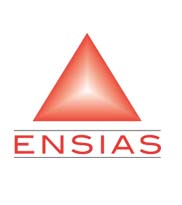- Accueil
-
L'Ecole
-
FORMATIONS
-
FORMATION INGENIEUR
-
Nouvelles filières offertes
- Ingénierie Intelligence Artificielle (2IA)
- Smart Supply Chain & Logistics (2SCL)
- Business Intelligence & Analytics (BI&A)
- Cybersécurité, Cloud et Informatique Mobile (CSCC)
- Data and Software Sciences (D2S)
- Génie de la Data (GD)
- Génie Logiciel (GL)
- Ingénierie Digitale pour la Finance (IDF)
- Smart System Engineering (SSE)
- REGLEMENT DES ETUDES DE L’ENSIAS CYCLE INGENIEUR
-
Nouvelles filières offertes
-
FORMATION INGENIEUR
- FORMATION CONTINUE
-
Recherche
- INTERNATIONAL
- ENTREPRISES
- VIE ESTUDIANTINE
- BIBLIOTHEQUE
LES DERNIÈRES INFORMATIONS
A multi-Agent based model for task scheduling in cloud-fog computing platform
| Titre | A multi-Agent based model for task scheduling in cloud-fog computing platform |
| Publication Type | Conference Paper |
| Year of Publication | 2020 |
| Authors | Fellir, F, A. Attar, E, Nafil, K, Chung, L |
| Conference Name | 2020 IEEE International Conference on Informatics, IoT, and Enabling Technologies, ICIoT 2020 |
| Mots-clés | Autonomous agents, Computational methods, Computing paradigm, Computing platform, Data handling, Digital storage, Fog, Fog computing, Improve performance, Internet of thing (IOT), Internet of things, Multi agent systems, Multi-agent based modeling, Multitasking, Resource Management, Resource utilizations, Scheduling, Scheduling algorithms, Simulation platform, Storage capability |
| Abstract | The Internet-of-Things (IoT) is a network of physical objects that communicate and exchange data between them over the Internet. These objects, or things, generate a massive amount of data that require powerful analytics approaches and data storage platforms - this is where cloud computing may well come into play. The classic cloud computing paradigm, however, faces several serious issues, due to centralization, such as low performance, latency issues, security issues, bandwidth obstacle, etc.. The Fog (Edge) computing paradigm has been proposed to improve the performance and to address other weaknesses, by providing IoT data processing and storage capabilities locally at the edges (IoT devices), instead of sending all the data to the centralized cloud. Whether in cloud or in fog computing, with billions of devices and a huge number of simultaneous requests, managing limited resources becomes essential. One of the important steps in resource management is task scheduling. In this paper, we consider task scheduling in a cloud-fog computing platform, we propose a multi-agent based model that aims at serving the most important task first, taking into consideration the task priority, its wait time, its status and the resources required to complete it successfully. Furthermore, in the scheduling process, we first propose an update to the priority value of the task, while taking into consideration its dependencies to other tasks and their priorities. Simulation results show that our proposed model can lead to better resource utilization and improve performance. © 2020 IEEE. |
| URL | https://www.scopus.com/inward/record.uri?eid=2-s2.0-85085496418&doi=10.1109%2fICIoT48696.2020.9089625&partnerID=40&md5=4ee0e2ab76422fc76603ec3b6f6942cb |
| DOI | 10.1109/ICIoT48696.2020.9089625 |
Revues:
LIENS UTILES
Localisation
Contactez-nous
ENSIAS
 Avenue Mohammed Ben Abdallah Regragui, Madinat Al Irfane, BP 713, Agdal Rabat, Maroc
Avenue Mohammed Ben Abdallah Regragui, Madinat Al Irfane, BP 713, Agdal Rabat, Maroc
![]() Télécopie : (+212) 5 37 68 60 78
Télécopie : (+212) 5 37 68 60 78
![]() Secrétariat de direction : 06 61 48 10 97
Secrétariat de direction : 06 61 48 10 97
Secrétariat général : 06 61 34 09 27
Service des affaires financières : 06 61 44 76 79
Service des affaires estudiantines : 06 62 77 10 17 / n.mhirich@um5s.net.ma
CEDOC ST2I : 06 66 39 75 16
Résidences : 06 61 82 89 77
- Compteur de visiteurs:639,828
Education - This is a contributing Drupal Theme
Design by WeebPal.
Design by WeebPal.



































